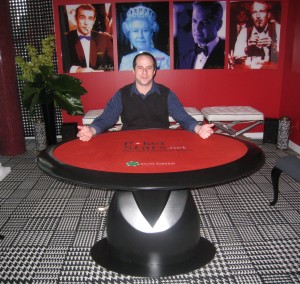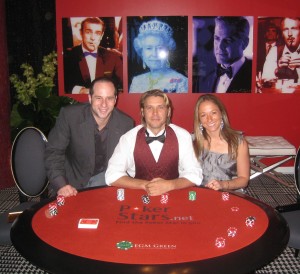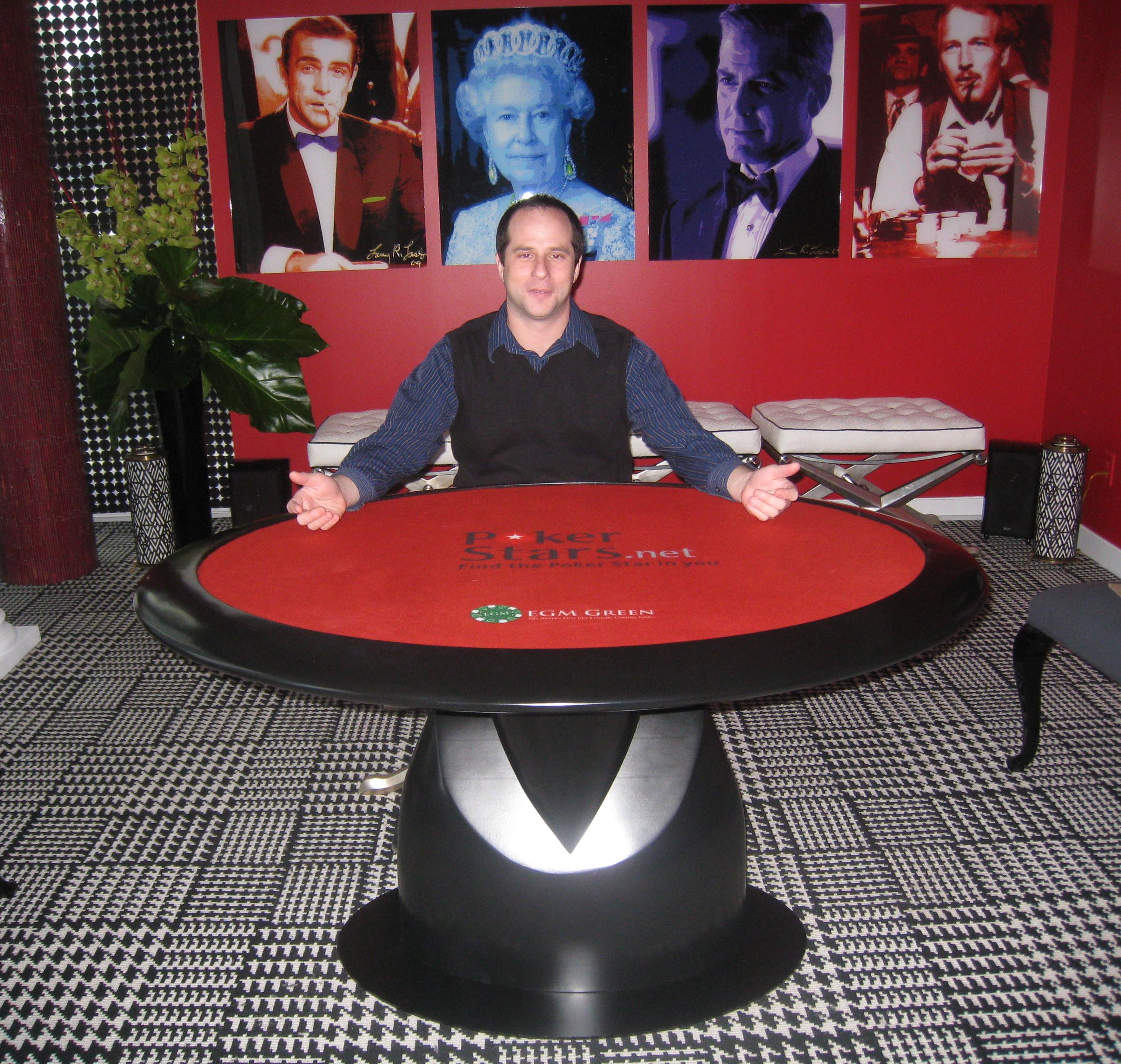
An “eco-friendly” poker table? What the hell is that? I asked Eric Hansel the same question when we met up at the Esquire House in NYC to check out his very special- and sustainable- creation. I also used the Esquire House tour with Eric as an opportunity to interview him and find out more about his very eco-friendly company, EGM Green. I learned all about sustainability, why the gaming industry is a prime candidate for Green consulting, all the cool products that EGM Green produces, how you can save 30% on your company’s energy bill, and more.
Uncover a lot more information on “gambling going Green” while perusing my interview with Eric below. Enjoy!
RL: How did you become interested in and educated in sustainability?
EH: I’ve always been into efficiency, and always been kind of a nature lover (grew up by the beach, went camping, canoeing, sailing) and realized a long time ago that we can’t keep doing the things we have been doing (as a world-wide community) and sustain the things that I love. Whether it is saving money, the environment, or our social surroundings, sustainability is about efficiency and that made it easy for me to begin my education in this field. To that end, I have attended countless seminars and classes through multiple channels, attended meetings and events, heard many speakers on sustainability and have spoken and written on sustainability. I originally came from the hospital world, where “see 1, do 1, teach 1” was how I learned, and that model fits perfectly with sustainability- new information is always coming out, and can most easily be disseminated.
In fact, as I am writing this, the Copenhagen meetings are going on. This should prove to the world that sustainability and energy conservation are here to stay and will be an important part of the world’s landscape for a very long time.
RL: What is EGM Green and what is your role within this organization?
EH: I am the Founder and President of EGM Green, and EGM Green’s business is sort of split in 2:
1) We design and build the only Eco-friendly casino tables, and you saw an example of one at the Esquire House. The Esquire House table was the epitome of luxury, and unless people were told, they had no idea it was sustainable. This is our goal with all products- to let people be wowed by the product itself and its form and functionality, and then add the bonus of it being Eco-friendly.
2) We also have a consulting side to the business which allows us to help educate and guide others so that they might enjoy the benefits of a more efficient operation (bigger profits, less waste). While most companies these days accomplish this by laying people off, we can achieve the same or greater positive change without any negative effects…the only thing that gets “laid off” is the company’s excess energy usage. We offer everything from lighting retro-fits to LEED project management to Customized Emissions Offsets (perfect for the online gaming world) and everything in between.
I am particularly proud of the newest service that we are in the process of launching. We are now offering outsource Chief Sustainability Officer contract work to companies looking to get a jump on their competition sustainability but are hesitant to commit the money and resources to hiring a full time Chief Sustainability Officer.

RL: What is an “eco-friendly” poker table? Tell me more about the poker table that was on display at the Esquire House. How did you come across this opportunity?
EH: All of our Eco-friendly tables are measured as a percent sustainable by weight, and I think they are the best tables being built right now…style, functionality, price and sustainability. Most of the tables that we build are at least 95% sustainable by weight, and the one at the Esquire House was the most sustainable by weight (99.5%) and also the most stylish. We have our collaborator and world famous designer, Larry Laslo, to thank for his amazing design. We will be working on three more tables with Larry.
We were brought into this opportunity by PokerStars, an organization that definitely understands the value in a sustainable model. Stars has also worked with us on a table for Mark Wahlberg’s Charity Golf Tourney and one for WSOP winner Peter Eastgate. I look forward to getting to work with the PokerStars team in the future.
RL: What does the phrase, “EGM is the green funnel into the casino industry” mean, exactly?
EH: We try to vet new Green technologies coming into the industry. We use our architects, engineers, LEED AP’s, marketing folks, sales people, and finance folks to determine where a technology can fit best, and how we can become involved in moving it large scale through the industry.
RL: Why is the casino industry a primary candidate for Green consulting? Does this include the online gambling industry as well?
EH: Online gaming is the first logical choice for sustainability consulting. An online casino/poker room has already got a leg up on the land based industry when it comes to sustainability because the players aren’t traveling to a building (plane, taxi, train…) and then staying there and using up resources. Instead, players stay at home (kind of like working from home), so the online gambling company’s emissions footprint is a lot smaller. This smaller footprint makes my life easy- I can present online gaming companies with just a couple of money saving initiatives that will also result in the positive PR that going Green gets.
Regarding the land based and the industry on a whole, we are looking at an industry that is thought of as one of the great wasters in the world. The excess that exists in the gaming industry lends itself to sustainability consulting. EGM Green can show a casino how to save 30% on their energy bill, for example. That is a pretty powerful statement to make! We can put those monies right back to a companies bottom line. How much revenue would you need to generate in order for your profit margins to stay the same in a down or even flat economy? If you had the ability to make “cuts” to your operations without having to lay people off, and instead just shed excess energy use, wouldn’t that be a much better answer?
RL: Can gambling companies cut costs by becoming “more Green”? How and by how much?
EH: YES!! When EGM Green consults with a casino/hospitality company, the first thing that we tell them is that a Green initiative should save them money…if it doesn’t, then its not being done right, or is not right for them at this time. That being said, we can typically save about 30% of the energy bill by combining some Energy Conservation Methods (ECM’s) to achieve the desired result. All of these initiatives will save them money with no negative effect to their processes, employees, or customers. I think that the 30% number is a good starting point because there are some second or third tier ECM’s that we can employ to bring the company’s energy costs to about $0. At the same time, we can also employ tactics to open up some new revenue streams that will make the company money for years to come.
RL: What is the Sustainable Gaming Standard Committee and what is your role within this committee?
EH: I am the Chairman of the Sustainable Gaming Standard Committee, a ground-breaking committee whose goal is to make slot machines 50% more energy efficient within the next five years. We will do this by looking at supply chain sustainability, packaging transportation, manufacturing of end product, end of life/repurposing, as well as some other things. After we address this energy issue that should allow for a reduction in casino floor operational costs by up to 50% (depending on the mix of electronic gaming machines and table games), we will move onto other energy bubbles within this industry. The best part about being the Chairman of this (ANSI) standard development process is that I get to surround myself with some pretty brilliant people, so my learning process is never over.
Ten years or so ago, the industry morphed from one with lots of smaller properties to one with very large resort style properties that offered additional amenities. These large properties provided the industry with new revenue streams, and now it is time to find more new revenue streams as these start to dry up or at least even off. By investing time, intellectual capital, and money into coming up with smarter, and more efficient ways to do things, our industry will have a leg up on other industries.
